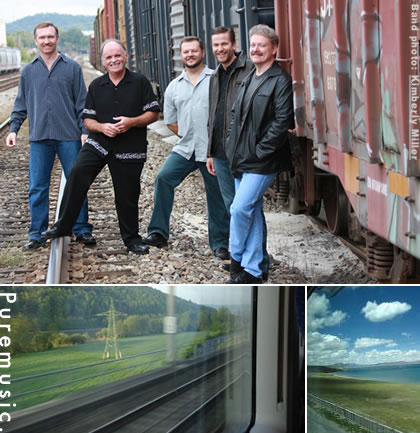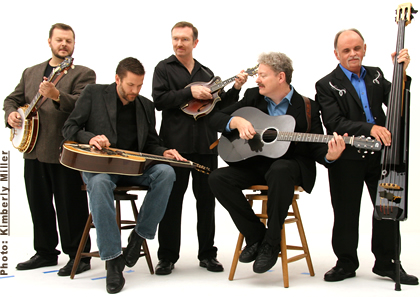
A Conversation with Tim Stafford (continued)
PM: Would you say that bluegrass is bigger than ever? Doesn't it seem like there are more performers and groups than ever?
TS: It does. But it's a trend in music, anyway, right now. With all the problem we're having with downloading and file sharing and all that, part of the problem is, too, that we've got so many bands right now. It's amazing. You know how many releases we have all the time.
PM: Oh, it's obscene, really.
TS: You can't do it, there's so much competition for people's ears, too, and for their time, with video games, DVDs, big screen HDTV--god, you name it. But I do think that bluegrass--ever since the O Brother thing, it seems like we've had a little bit more respectability.
PM: And when you look back, how can it be that such a funny silly little movie kicked that thing off?
TS: That's a really good point.
PM: I mean, it was just a movie.
TS: I Know.
PM: But that's where it began.
TS: It's always been some kind of media event. It was either the Beverly Hillbillies or--
PM: Right, of course.
TS: --or "Dueling Banjos" or--
PM: Oh, wow, I never thought of it like that, Tim. It was The Hillbillies and "Dueling Banjos" that kicked bluegrass down the road at those times.
TS: Right. Or Bonnie and Clyde. Every time something like that would come along there would be talk that, "Hey, this is when bluegrass is going to get a shot."
PM: Right. "I'm going to go get a banjo."
TS: Yeah. And think about all the people that those things inspired. Bela Fleck got inspired to play by hearing "Dueling Banjos."
PM: Really? [laughs]
TS: Yeah, that was where he got started. I know the first time I heard the banjo was on The Beverly Hillbillies. I used to watch it all the time.
PM: Yeah, I still think about Miss Hathaway and the cement pond and all that stuff.
[laughter]
PM: It's in our DNA, I mean...
TS: Our cultural DNA. That swimming pool sure can get shallow.
PM: [laughs] Oh, that's funny.
It also struck me--do you think the younger set is catching on nationally to bluegrass at the festival circuit, for instance?
TS: Yeah. I think the jamgrass phenomenon fueled by the residue of The Dead movement--
PM: Right, the acoustic side of The Dead.
TS: --and the Phish phenomenon, and the whole jamgrass thing... We just played for Relix. We did a conference for them up in New York. So there's a magazine that deals with that now that's very popular.
PM: The Relix people are starting a country magazine.
TS: Yeah, that's what I've heard. If you go to Colorado and places like that, you see all of these young kids playing, as well as the young fans.
PM: Right, hippie-grass.
TS: Absolutely. It's so big out there. It's just huge. That's a new thing. I don't think we had that kind of thing 10 years ago, not like it is right now.
PM: Well, even with all the competition that there is out there for the stage and people's concert dollar, I hope it's translating to a reasonably solid living for great bluegrass guys.
TS: It's actually going pretty well. I don't know, I can't speak for everybody else in the music. But this last year was our best year ever, financially and otherwise. We don't play that many shows, either. We only do like 70 shows a year usually at the most.
PM: That's a beautiful number. That's like an ideal number.
TS: Well, it works out good for us because three of the guys have kids that are under eight years old.
PM: Wow.
TS: I understand what that's like. Mine is 16 now. But I remember when he was that age, that's when the band started. Well, when our band started he was two. And I remember not wanting to be gone that much back in those days.
PM: Yeah. The last question I have is just something that was rolling around in my head. I don't know if it plays or not. It seemed to me that as perhaps the two essentially American musical forms, there are parallels between jazz and bluegrass that can be drawn, don't you think?
TS: I think so. And I know that a lot of players, for whatever reason, whether it's Tony Rice or David Grisman, whatever, in bluegrass, have really learned to appreciate that. Our band is a good example. We got a couple of guys that are just kind of ate up with it. Shawn is really interested in it, too, and I've always loved jazz, but Rob and Jason can play it pretty fluently.
PM: Really?
TS: Yeah, yeah. They're really good at it.
PM: And it's curious that the level of musicianship involved in those two forms is so high that to some degree it qualifies, if not limits, both the participants and the aficionados.
TS: I think so. It's sort of the hazard of that kind of music on one level. But bluegrass has got a lot of other things going for it, too. It can be real participator friendly, too. You don't have to have a tremendous amount of knowledge to start playing bluegrass. Whereas in jazz you probably have to have a pretty--
PM: You can't even get started without a bunch of chops, right.
TS: Yeah, man, you got to have a lot of chops in order to really get into it.
PM: And you've got to have theory. I mean, you don't got to have theory to play good bluegrass, you just got to go get yourself some chops.
TS: You have to have a good ear.
PM: Yeah.
TS: That's maybe the difference, I guess. I mean, everybody who knows music knows that the jazz cats have really got the chops. That's what we kind of aspire to--not to play jazz but to play with that kind of proficiency.
PM: But yeah, that's the thing that bluegrass really has going for it, when you compare it with jazz, it's got that down-home quality that jazz doesn't even pretend to--
TS: Yeah, that's true.
PM: --because it comes from the hills.
TS: There are some definite parallels, but there are also some big differences, there's no doubt about that. But there are probably not two more uniquely American kinds of music, I don't think.
PM: Yeah, those are a couple of things we still do best.
TS: Absolutely.
PM: Well, Tim, it's really, really nice to meet you. I really enjoyed the new record. And I'm really grateful for your time tonight.
TS: Yeah, Frank, I enjoyed this. You're very knowledgeable. You're like the absolute polar opposite of this interview we did in New York with Joey Reynolds the other night.
PM: Really?
TS: Joey, man--I mean, he's in the Rock 'n' Roll Hall of Fame, and he had no idea who the hell we were.
PM: [laughs] Oh, that's terrible.
TS: And not just us, but I mean, he didn't know anything about bluegrass. He said, "So you play a form of country music."
TS: And I said, "Yeah, we play bluegrass." He said, "Oh, my least favorite kind of country music."
PM: Oh, my God!
TS: And we were like, "Uhhhh, okay."
PM: "Well, should we apologize, or just leave, or what?" [laughs]
TS: The thing was--I don't know, it just sort of ended up being funny after a while, because he wouldn't even ask us questions, and when he did, he would just answer them himself.
PM: [laughs]
TS: He just rattled on from one subject to the other.
PM: What a nightmare!
TS: It was. It really was. [laughs]
PM: Well, I'm glad I could provide a little relief from that experience.
TS: Oh, man, 100 percent the other direction, yeah. I appreciate it.
PM: Well, thanks again for your time, Tim. And I look forward to meeting you sometime around town, and seeing you guys play.
TS: Oh, thanks so much, Frank. You take care.
![]()

listen to clips print interview (pdf) rounder.com
bluehighwayband.com tim-stafford.com
robickes.com see more photos by Kimberly Miller

